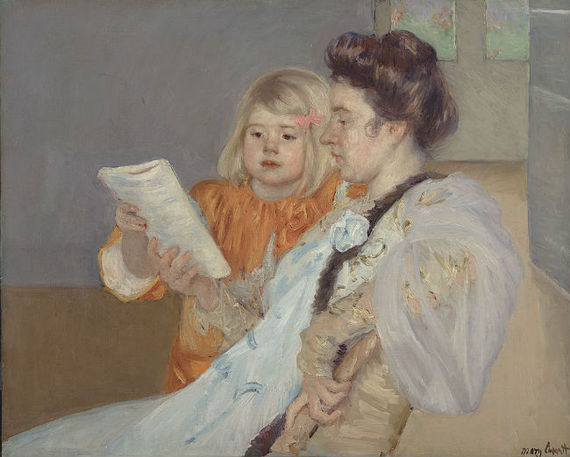
A debate has erupted over whether reading fiction makes human beings more moral. But what if its real value consists in something even more fundamental?
June 21, 2013
A battle over books has erupted recently on the pages of The New York Times and Time. The opening salvo was Gregory Currie's essay, "Does Great Literature Make Us Better?" which asserts that the widely held belief that reading makes us more moral has little support. In response, Annie Murphy Paul weighed in with "Reading Literature Makes Us Smarter and Nicer." Her argument is that "deep reading," the kind of reading great literature requires, is a distinctive cognitive activity that contributes to our ability to empathize with others; it therefore can, in fact, makes us "smarter and nicer," among other things. Yet these essays aren't so much coming to different conclusions as considering different questions.

To advance her thesis, Paul cites studies by Raymond Mar, a psychologist at York University in Canada, and Keith Oatley, a professor emeritus of cognitive psychology at the University of Toronto. Taken together, their findings suggest that those "who often read fiction appear to be better able to understand other people, empathize with them and view the world from their perspective." It's the kind of thing writer Joyce Carol Oates is talking about when she says, "Reading is the sole means by which we slip, involuntarily, often helplessly, into another's skin, another's voice, another's soul."
Oatley and Mar's conclusions are supported, Paul argues, by recent studies in neuroscience, psychology, and cognitive science. This research shows that "deep reading -- slow, immersive, rich in sensory detail and emotional and moral complexity -- is a distinctive experience," a kind of reading that differs in kind and quality from "the mere decoding of words" that constitutes a good deal of what passes for reading today, particularly for too many of our students in too many of our schools (as I have previously written about here).
Paul concludes her essay with a reference to the literary critic Frank Kermode, who famously distinguishes between "carnal reading" -- characterized by the hurried, utilitarian information processing that constitutes the bulk of our daily reading diet -- and "spiritual reading," reading done with focused attention for pleasure, reflection, analysis, and growth. It is in this distinction that we find the real difference between the warring factions in what might be a chicken-or-egg scenario: Does great literature make people better, or are good people drawn to reading great literature?
Reading is one of the few distinctively human activities that set us apart from the rest of the animal kingdom.
Currie is asking whether reading great literature makes readers more moral -- a topic taken up by Aristotle in Poetics (which makes an ethical apology for literature). Currie cites as counter-evidence the well-read, highly cultured Nazis. The problem with this (aside from falling into the trap of Godwin's Law) is that the Nazis were, in fact, acting in strict conformity to the dictates of a moral code, albeit the perverse code of the Third Reich. But Paul examines the connection of great literature not to our moral selves, but to our spiritual selves.
What good literature can do and does do -- far greater than any importation of morality -- is touch the human soul.
Reading is one of the few distinctively human activities that set us apart from the rest of the animal kingdom. As many scholars have noted, and Paul too mentions in her piece, reading, unlike spoken language, does not come naturally to human beings. It must be taught. Because it goes beyond mere biology, there is something profoundly spiritual -- however one understands that word -- about the human ability, and impulse, to read. In fact, even the various senses in which we use the word captures this: to "read" means not only to decipher a given and learned set of symbols in a mechanistic way, but it also suggests that very human act of finding meaning, of "interpreting" in the sense of "reading" a person or situation. To read in this sense might be considered one of the most spiritual of all human activities.
It is "spiritual reading" -- not merely decoding -- that unleashes the power that good literature has to reach into our souls and, in so doing, draw and connect us to others. This is why the way we read can be even more important than what we read. In fact, reading good literature won't make a reader a better person any more than sitting in a church, synagogue or mosque will. But reading good books well just might.
It did for me. As I relayed in my literary and spiritual memoir, the books I have read over a lifetime have shaped my worldview, my beliefs, and my life as much as anything else. From Great Expectations I learned the power the stories we tell ourselves have to do either harm and good, to ourselves and to others; from Death of a Salesman I learned the dangers of a corrupt version of the American Dream; from Madame Bovary, I learned to embrace the real world rather than escaping into flights of fancy; from Gulliver's Travels I learned the profound limitations of my own finite perspective; and from Jane Eyre I learned how to be myself. These weren't mere intellectual or moral lessons, although they certainly may have begun as such. Rather, the stories from these books and so many others became part of my life story and then, gradually, part of my very soul.
As Eugene H. Peterson explains in Eat this Book, "Reading is an immense gift, but only if the words are assimilated, taken into the soul -- eaten, chewed, gnawed, received in unhurried delight." Peterson describes this ancient art of lectio divina, or spiritual reading, as "reading that enters our souls as food enters our stomachs, spreads through our blood, and becomes . love and wisdom." More than the books themselves, it is the skills and the desire to read in this way which comprise the essential gift we must give our students and ourselves. But this won't happen by way of nature or by accident.
Maryanne Wolf, director of the Center for Reading and Language Research and author of Proust and the Squid: The Story and Science of the Reading Brain, has studied "deep reading" in the context of the science of the brain. She describes the fragility of the brain's ability to read with the kind of sustained attention that allows literature to wield its shaping power over us:
The act of going beyond the text to analyze, infer and think new thoughts is the product of years of formation. It takes time, both in milliseconds and years, and effort to learn to read with deep, expanding comprehension and to execute all these processes as an adult expert reader. . Because we literally and physiologically can read in multiple ways, how we read--and what we absorb from our reading -- will be influenced by both the content of our reading and the medium we use.
The power of "spiritual reading" is its ability to transcend the immediacy of the material, the moment, or even the moral choice at hand. This isn't the sort of phenomenon that lends itself to the quantifiable data Currie seeks, although Paul demonstrates is possible, to measure. Even so, such reading doesn't make us better so much as it makes us human.